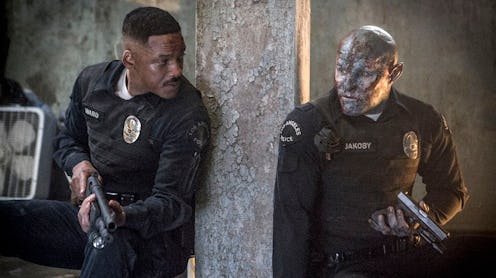Entertainment
Why Chance The Rapper Is Calling Out Netflix's 'Bright' For Its Depiction Of Racism

While most of the recent conversation over Netflix movies has belonged to holiday-themed films like A Christmas Prince, there's a new creation from the streaming giant that's stirring up controversy — the action film Bright. About a world in which humans and mystical creatures co-exist, the Will Smith-starring movie has garnered poor reviews since its release, including for the way it handles racism. And it's not just from regular fans; on Tuesday, Chance the Rapper tweeted his thoughts on the movie, critiquing it for the way it attempts — and fails — to represent racism and racial hierarchies.
"I always feel a lil cheated when I see allegorical racism in movies cause that racism usually stems from human emotion or tolerance but not by law or systems the way it is in real life," Chance wrote on Twitter Tuesday night, in addition to other thoughts on the film's "shallow" depiction of racism. In Bright, the division between beings lies in three different groups: orcs, humans, and elves. The orcs are at the bottom of the hierarchy and are blatantly discriminated against by the humans. The elves, meanwhile, are the light-skinned creatures at the top of the racial hierarchy. There are also fairies, but as Smith's character actually says, "fairy lives don't matter."
Bright stars Smith as a police officer named Daryl Ward, who is forced to work with an orc named Nick Jakoby (Joel Edgerton). Because Jakoby entered the police force through a diversity initiative, he's the only orc, and early in the movie, all of the police officers — most of whom are non-white — tease and mock Jakoby based on his Other appearance. It may be an allegory for the U.S.'s racial divides throughout history, but its poor handling of the theme, as Chance The Rapper says, cheats people out of a meaningful portrayal of racism in the U.S.
Although Ward, as played by Smith, is Black, the officer takes part in stereotyping and discriminating against Jakoby and other orcs. He calls one orc a "Green pig nose piece of sh*t” and says that Jakoby is a "Shrek looking ass." It's a clear metaphor about the way minorities are often treated, but in a badly-written fantasy action movie, it doesn't work. Rather than criticize the police force's racist biases and discrimination against orcs, Bright instead makes a hero out of Jacoby, who attempts to defy his "own kind" and work with the police officer. And racism itself is hardly ever addressed head-on, just alluded to over and over again.
In a scene which Chance the Rapper told his fans about, Jacoby — an orc — is (spoiler alert) lynched by a gang of other orcs. In that scene, the one leading the lynching says to him, "You would’ve made a great orc,” as if to suggest that by refusing to partake in criminal behavior, Jacoby is not living up to his potential. After he killed by the group, Jacoby comes back to life and in the end saves the day, but the fact that the movie depicts orcs mostly as gangsters and bad guys, and that Jacoby is considered a better person because he teams up with his oppressors, isn't exactly great. Considering the real-life issues with police brutality and racism in the police force, the suggestion that the people who are actually racist aren't the ones who need to change is a major issue.
Bright also includes problematic depictions of Latinx characters, as the two cops have a few run-ins with the "Altamira Gang," comprised of Spanish-speakers with face tattoos. While attempting to reason with them, Ward tells them that they've only heard "Ghetto rumors, homie," unnecessarily perpetuating stereotypical depictions of a minority. Once again, the movie fails in its attempt to meaningfully comment on the real world's racial dynamics.
Towards the end of the movie, someone says to Jacoby about Ward, "Your buddy’s so happy to say he’s got an Orc friend." That line is meant to satirize the common — and problematic — excuse that white people make to defend themselves against being called racist. Just earlier in December, Roy Moore's wife said that she has a Jewish lawyer as counter evidence to people's accusations of her being Anti-semitic. Just as he words missed the mark so glaringly, so does Bright, as it mixes metaphors and is both too abstract and too close to home to make any meaningful allegory about real racial divides. And while there might be some things to admire about Bright, Chance the Rapper was completely right in calling out its problematic depiction of race.